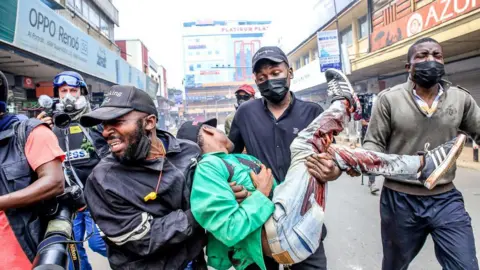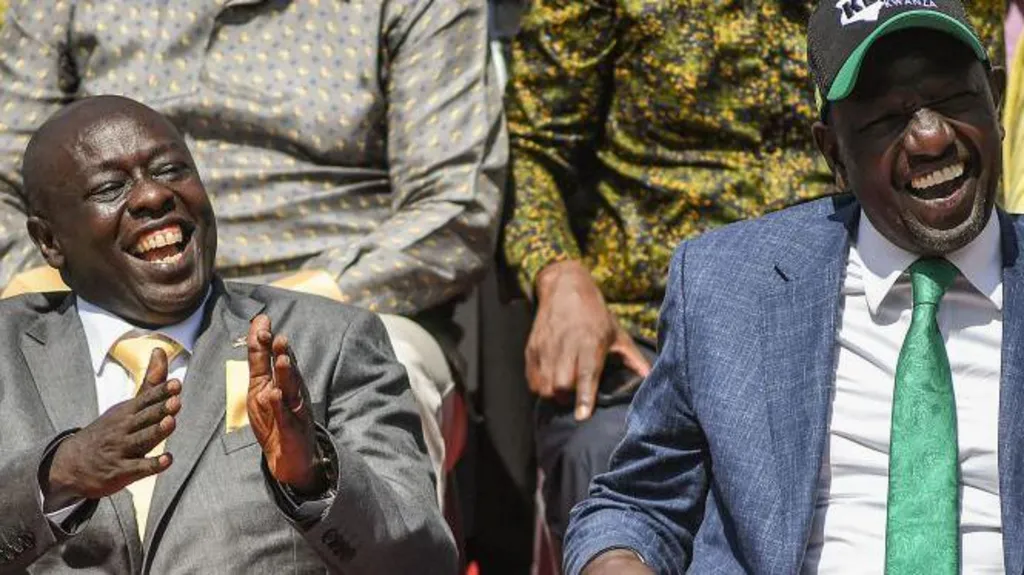Kenyan lawmakers have initiated the process to oust the country’s deputy president from office.
Supporters of the move accuse Rigathi Gachagua of being involved in June’s anti-government protests, which turned violent, and allege his role in corruption, undermining the government, and promoting ethnic divisions.
Gachagua has denied all the accusations.
This marks the peak of a significant rift between Gachagua and President William Ruto.
On Tuesday, the Speaker of the National Assembly gave the green light for impeachment proceedings after 291 MPs—far exceeding the required 117—supported the motion.
The impeachment is expected to pass easily through both houses of parliament, especially after the main opposition teamed up with the president’s party in the wake of recent protests. However, no date has been set for the actual vote.
Attempts to block the impeachment through legal channels have failed.
The ongoing power struggle between the president and his deputy has sparked concerns about government instability, particularly as Kenya grapples with a severe economic and financial crisis.
Ruto selected Gachagua as his running mate in the 2022 election, which saw him narrowly defeat former Prime Minister Raila Odinga in a contentious race.
Gachagua, hailing from the vote-heavy Mount Kenya region, played a key role in securing support for Ruto.
However, with members of Odinga’s party joining the government after the youth-led protests that forced Ruto to abandon a tax hike, the political landscape has shifted, leaving Gachagua increasingly isolated.
Despite this, Gachagua has remained defiant, claiming he still has strong backing from voters in his home region of central Kenya.
“Two-hundred [legislators] cannot overturn the will of the people,” he said.
For the motion to pass, it needs the backing of at least two-thirds of the members of both the National Assembly and Senate, excluding nominated members.
Supporters of the motion are optimistic it will gain approval.
But Gachagua has made it clear that he will not go down without a fight.
“The president can ask MPs to stop. So, if it continues, he’s in it,” he told media outlets before Tuesday’s parliamentary session.
Ruto has previously pledged not to subject Gachagua to “political persecution,” similar to what he claims to have faced while serving as deputy to former President Uhuru Kenyatta.
However, tensions between Ruto and Gachagua have become evident in recent months.
The deputy president’s noticeable absence during Ruto’s departures for international trips and his returns has drawn attention.
Interior Secretary Kithure Kindiki, a law professor trusted by the president, seems to be taking over some of Gachagua’s duties—a scenario reminiscent of Ruto’s fallout with Kenyatta.
Like Gachagua, Kindiki hails from the Mount Kenya region, which represents Kenya’s largest voting bloc.
Dozens of legislators have rallied behind Kindiki as the region’s preferred “mouthpiece”, intensifying speculation that they are pushing for him to succeed Gachagua.
That has left the deputy president largely isolated with only a handful of elected politicians backing him.

In a further sign that he is in political trouble, the police’s Directorate of Criminal Investigations (DCI) recently recommended charges against two MPs, a staff member and other close allies of the deputy president, after accusing them of “planning, mobilising and financing violent protests” that occurred in June.
Gachagua defended the accused, denouncing the charges as an “act of aggression” and an “evil scheme” to “soil” his name and lay the groundwork for his impeachment.
In parliament last week, Kindiki – under whose ministry the DCI falls – pledged to remain neutral, but made it clear that “high-level individuals” will be prosecuted.
“We are dealing with the aftermath of the attempted overthrow of the constitution of Kenya by criminal and dangerous people who almost burnt the parliament of Kenya. We have a job to do,” he said.
But many of the young people who were at the forefront of the protests dismiss suggestions that Gachagua’s allies were behind it, and see the bid by lawmakers to oust him as an attempt to deflect attention from bad governance.
They say that if the deputy goes, the president must go too.
In the Senate, an opposition legislator has filed a censure motion against the president. It does not bear the same weight as impeachment and has no legal consequence.
Ruto, who is expected to host legislators from his party later this week, will be weighing the political risks of moving against Gachagua, but some lawmakers say they do not want him to wade into the debate – a tough ask.
For now, Gachagua’s fate rests with legislators, but one man might still extend him a renewed lease of political life – the president.

